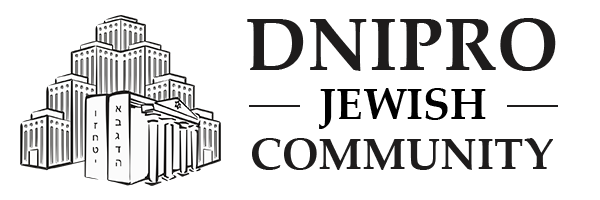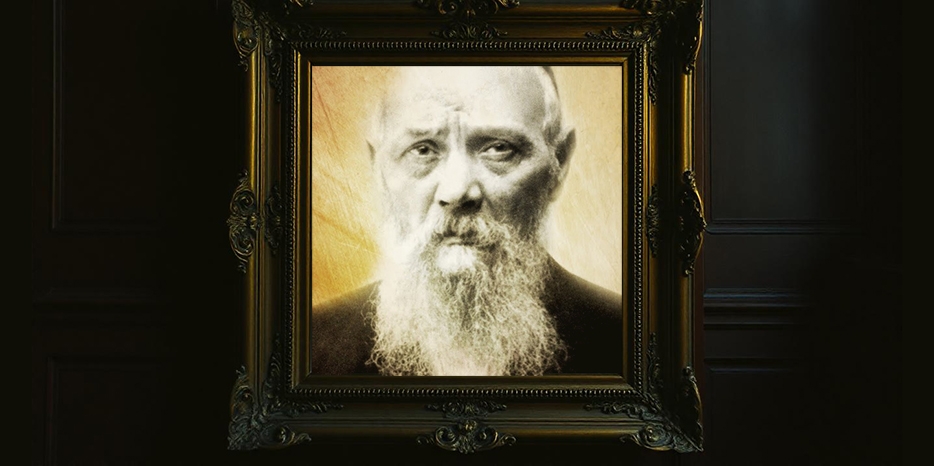This evening, with the onset of the 20th of Av, Jews around the world are marking the anniversary of the passing from the material world (yahrzeit) of Rabbi Levi Yitzchak Schneerson, the father of the Seventh Lubavitcher Rebbe, Menachem Mendel Schneerson, Chief Rabbi of Yekaterinoslav-Dnepropetrovsk from 1909-1939, considered the founder of the modern Jewish community of our city.
In honor of this memorable date, many events dedicated to Rabbi Levi Yitzchak are taking place around the world – farbrengens, lessons and special classes. In Dnipro, lessons and farbrengens dedicated to Rabbi Levi Yitzchak Schneerson will also take place.
The great son of Rabbi Levi Yitzchak, the Head of our generation, the Seventh Lubavitcher Rebbe Menachem Mendel Schneerson, especially emphasized the importance of this day and the collection of donations on this day in honor of the righteous man. Thus, at one of the farbrengens in honor of the 20th of Av, the Rebbe said: “When something is not mentioned, people may decide that, well, in our time it is no longer relevant. Therefore, we are reminding about the Levi Yitzchak Fund. I believe that leaflets will be distributed, and everyone will donate as much as they can, and even much more than they decided at the beginning. And the Almighty, of course, will repay for this many times more… and even five hundred times more, literally…”.
According to tradition, let us briefly recall the biography of the great righteous man and Kabbalist.
Levi Yitzchak ben Zalman Schneerson was born on 18 Nisan 5638 (1878) in the town of Poddobryanka near Gomel. His lineage goes back to the Third Lubavitcher Rebbe, the Tzemach Tzedek. Levi Yitzchak began studying Torah under the guidance of the Rabbi of Poddobryanka, Yoel Chaikin, his mother’s uncle. He quickly surpassed his teacher and continued studying the sacred texts on his own. Rebbe Rayatz wrote that “from an early age, Levi Yitzchak was distinguished by his extraordinary abilities and diligence.” He received certification (smicha) as a rabbi from the greatest authorities of that time: Rabbi Eliyahu Chaim Meisel of Lodz and Rabbi Chaim of Brest.
In 1900, Rabbi Levi Yitzchak married Chana, the daughter of Rabbi Meir Shlomo Yanovsky. They were matched by the Fifth Lubavitcher Rebbe, Sholom Dov-Ber Schneerson. After the wedding, the young couple moved to Nikolaev, where Chana’s father was a rabbi. In Nikolaev, on 11 Nisan 5662 (18 April 1902), Levi Yitzhak and Chana had a son, Menachem Mendel. Later, two more children were born to the family: Dov-Ber and Israel-Arie-Leib.
In 1907, R. Levi Yitzhak’s family moved to Yekaterinoslav. They settled on the second floor of house No. 20 on Zheleznaya (Mironova) Street. Then, in 1928-1934, they lived in house No. 15 on the corner of Zheleznaya and Upornaya (Glinka) Streets. And their last apartment was on Barrikadnaya, 13.
In 1909, at the age of 31, Rabbi Levi-Yitzchak was invited to the post of rabbi of the Yekaterinoslav community, which was one of the largest in Russia – about 50 thousand Jews lived here, who made up 40 percent of the entire population. There were 12 synagogues, a yeshiva, about 1,500 children studied in cheders, the rest in 16 private Jewish schools.
The wave of Jewish pogroms in 1905 did not pass by Yekaterinoslav. More than a hundred people died at the hands of the murderers, more than two hundred were wounded, about 300 Jewish shops were destroyed and burned. Hundreds of poor families were left homeless and without means of subsistence. Many left the city, emigrated to America and Palestine. Subsequently, the instigators of the pogrom were tried and found guilty, however, Tsar Nicholas II pardoned them, clearly showing on whose side the autocracy was.
Out of fear for their lives, Jews began to abandon the religion of their fathers. Among the youth, for whom the Jewish faith prevented them from receiving an education, cases of baptism became more frequent.
This was the situation in the Jewish community of the city when Rabbi Levi-Yitzchak began to fulfill his duties as rabbi in Yekaterinoslav.
His election did not go smoothly. The local intelligentsia opposed the young rabbi’s candidacy, wanting to see a less orthodox person as the community’s spiritual leader. They approached the most authoritative person in the city, engineer Sergei Pavlovich Paley, one of the leaders of the city’s Zionist organization, with a request that he use his influence to prevent the election of a Hasid from the Schneerson dynasty. Paley said that he did not like to follow anyone’s lead. He decided to meet the candidate himself and went to see Rabbi Levi Yitzchak. They talked for six hours straight, and after the conversation Paley became one of the new rabbi’s most ardent supporters.
Having become the head of the Jewish community of Yekaterinoslav, Rabbi Levi-Yitzchak devoted himself entirely to the performance of his numerous and varied duties. First of all, he decided to achieve the construction of a new mikvah, since the old one had fallen into disrepair. However, the community leaders did not support him, citing a lack of available money. Then Rabbi Levi-Yitzchak took off his new coat and put it on the table. “It cost me a lot,” he said, “but the mikvah is even more precious to me, and I am donating my coat for the construction.” The rabbi’s conviction had an effect on the indifferent. Soon a new mikvah appeared in the city.
In a short time, the rabbi’s authority strengthened and grew so much that people turned to him for solutions to any problems and disputes, since they knew that his advice would be smart and fair. Soon, R. Levi-Yitzchak became widely known outside of Yekaterinoslav. His phenomenal memory, sharp mind, and comprehensive knowledge placed him in the first rank of rabbis of that time. The fifth Lubavitcher Rebbe, Rabbi Sholom Dov-Ber Schneerson, repeatedly sent him abroad, where R. Levi-Yitzchak had to meet with famous rabbis and public figures.
Telling episodes from their lives, the rabbi’s wife, Rebbetzin Chana, recalled how once, when they were traveling to Warsaw, a famous writer sat down in their compartment. A conversation began between him and the rabbi. The interesting conversation attracted the attention of the passengers, people from other cars stopped to listen. Gradually a crowd gathered near the compartment, and although the conversation lasted all night, no one left.
During one of his trips to Germany, when Rabbi Levi Yitzchak had to stop in Wiesbaden, a local rabbi came to visit him. They began a conversation that soon turned into a monologue by Rabbi Schneerson – the guest listened to him greedily, without opening his mouth.
As he said goodbye, the delighted rabbi strongly advised Rabbi Levi Yitzchak’s wife to write down her husband’s statements in order to later publish them as a separate book.
Rabbi Levi Yitzchak wrote commentaries on all sections of the Torah. When he was arrested, thousands of pages he had written were left at home. Unfortunately, most of the priceless manuscripts were confiscated, and what survived the barbaric raid of the NKVD was destroyed by the Nazis. Occupying cities, they exterminated not only Jews, but also all Jewish relics.
Rabbi Levi Yitzchak Schneerson was especially active in Jewish communal activities, showing genuine self-sacrifice when it came to helping his fellow man. In this regard, his efforts to provide matzah to Jewish soldiers during the Russo-Japanese War of 1904-1905, as well as his assistance in preparing the defense materials during the infamous Beilis affair, deserve special mention.
After the February Revolution of 1917, when the Provisional Government proclaimed democratic freedoms, various organizations and unions immediately emerged. Rabbis and Jewish public figures also created their own organization. Its first congress in Moscow was to develop a program for the organization and present its demands to the government. One of the active participants in this congress was Rabbi Levi-Yitzchak Schneerson. Similar meetings were held in Petrograd, Ukraine and Belarus: in the summer of 1917, a commission was created from representatives of all these organizations. However, the October Revolution destroyed the barely born democracy.
As is well known, under Soviet rule a furious anti-religious campaign began. Especially active was “Evsektsiya” under the Central Committee of the All-Union Communist Party (Bolsheviks). Rabbi Levi-Yitzhak entered into a fearless fight against any persecution of religion. Using the formal statements of the USSR leaders about freedom of religion and human rights, he resolutely defended the religious needs of Jewish communities.
Condemning the anti-religious actions of the Soviet authorities, the Pope issued an appeal to the entire free world, calling for a boycott of Soviet goods. He declared a crusade against militant Soviet atheism. In response, the Soviet authorities took countermeasures. Along with official denials, a statement was issued by 32 Belarusian rabbis, which stated that the Pope’s appeal did not correspond to reality: allegedly there was no discrimination against believers and clergy in the country. These rabbis were gathered in Minsk and threatened into signing an outright lie.
A similar statement was demanded from the Ukrainian rabbis, for which a rabbinical congress was convened in Kharkov. Knowing what influence Rabbi Levi-Yitzhak Schneerson enjoyed, the head of the NKVD of Dnepropetrovsk summoned him for a conversation and explained what benefit the rabbis would bring to the Soviet government, and the statement was signed. At the same time, he handed the rabbi a free ticket to Kharkov in the first class of the express train. However, Rabbi Levi-Yitzhak did not accept the handout. He thanked him and said that he was still able to go to Kharkov at his own expense.
There were more NKVD agents than rabbis at the congress, but this did not disconcert Rabbi Levi-Yitzhak. He declared that he considered it impossible to sign a statement based on deception. His bold and open speech encouraged those who wavered, the congress dragged on for several days, and Rabbi Levi-Yitzhak continued to explain to everyone what tragic consequences the signing of a false document could lead to. The Minister of Education of Ukraine summoned Rabbi Levi-Yitzhak and accused him of “hostile actions” against the Soviet government. It is clear what such accusations meant in the thirties. However, Rabbi Levi-Yitzhak did not allow himself to be intimidated, did not change his position, and his steadfastness influenced the other delegates. In the end, the congress closed without any resolution at all.
However, Rabbi Levi Yitzchak believed that the victory achieved would not be strong enough if the Bolsheviks managed to hide the truth about the failure of the rabbinical congress. He managed to smuggle information about the congress abroad, and it was widely published in the world press. A caustic caricature appeared: a rabbi kneeling in front of a chair with a piece of paper on it, and a soldier pointing a revolver at him and demanding that he sign.
In 1939, a census was conducted in the USSR. Everyone had to indicate in the questionnaire whether they were a believer or not. After many years of persecution of religion, people were afraid to tell the truth and often wrote “no”, although in fact they were believers. Upon learning of this, Rabbi Levi-Yitzhak gave a fiery speech in the synagogue, convincing those gathered that Jews should under no circumstances hide their faith in the One God.
The rabbi’s words naturally became known to the NKVD, which had its informants everywhere, including in the synagogue. When the rabbi was arrested, he was also charged with this during the investigation. Rabbi Levi-Yitzhak responded that during the census the authorities were obviously interested in truthful information, and by calling for the truth to be told, he was only helping the authorities.
On 9 Nisan 1939, at three o’clock in the morning, representatives of the NKVD burst into the rabbi’s apartment. After a search that lasted many hours, they took away books, papers, manuscripts and took the rabbi himself away. All attempts by his wife to find out where he was remained unsuccessful for a long time.
The NKVD investigators did everything possible to fabricate charges of anti-Soviet activity and sentence Rabbi Levi-Yitzhak to death, but the prisoner’s steadfast behavior ruined their plans. They were unable to force the rabbi to confess to “crimes” and sent him into exile in Kazakhstan.
He lived there in a remote place, but in the nearest city of Kzyl-Orda during the war there were quite a few Jews, some of whom personally knew Rabbi Levi-Yitzhak, while others had heard about the famous rabbi. Sometimes they came to him and talked about religious topics.
The rabbi had no paper to write down his thoughts, and he sat for hours in deep thought. Later, with great difficulty, he managed to obtain permission to move to Alma-Ata. Here he was joyfully welcomed, and again the rabbi’s house became a center that attracted many people. Rabbi Levi-Yitzchak was seen as a teacher and mentor, but his health was already undermined.
His condition was getting worse day by day.
There is a witness account of the last day of Rabbi Levi Yitzchak in the book Teldeis Levi Yitzchak.
“On Tuesday night, I and another [person] were privileged to spend the entire night by his bedside […]. His lips were constantly moving, but no voice was heard. Suddenly he came to, opened his eyes, and asked for water to be brought to wash his hands. When the water was brought, he said: “It is time to cross over to the other side!” These were his last [conscious] words. The next day, Wednesday, 20 Menachem Av, his condition worsened, he suffered from severe pain and was delirious incessantly. One of those present put his ear to his lips to hear what his lips were whispering, and heard fragmentary words coming out along with a groan: “Veikveiseho ley neidou… Ai, ikveis Meshiho… Ikveis Meshiho…” Towards evening […] his pure soul separated from his body and ascended to Heaven.”
His grave in the Jewish cemetery in Almaty became a place of veneration. The Soviet government managed to fully rehabilitate and admit its guilt for the death of Rabbi Levi-Yitzchak Schneerson in 1989. In 1995, a three-volume biography of Levi-Yitzchak was published in the United States and Israel.




